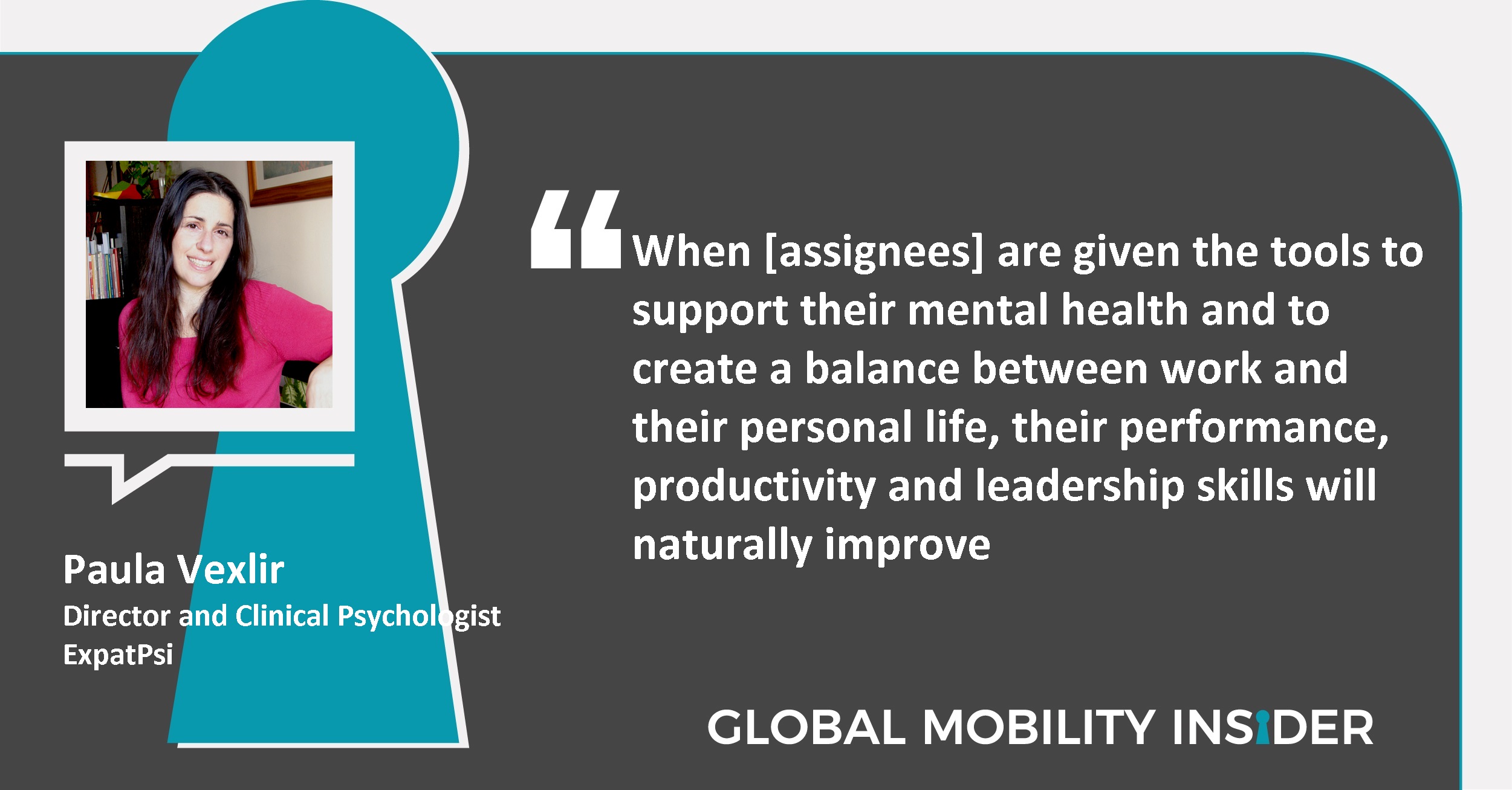Paula Vexlir - Director and Clinical Psychologist - ExpatPsi
Name: Paula Vexlir
Position: Director and Clinical Psychologist
Company: ExpatPsi

Professional Background
ExpatPsi, Director and Psychologist (Argentina): 2002 – Present
Eutelmed, Clinical Psychologist (Argentina): 2013 – Present
ComPsych, Crisis Management Specialist (Argentina): 2013 – Present
Ameghino Public Hospital, Clinical Psychologist (Argentina): 2002 – 2007
Motorola Mobility, Knowledge Management and Quality Leader (Argentina): 1995 – 2001
Career Insider
Q: Why expat psychology, and how did you get started in this area?
A: It wasn’t planned at all. By the year 2002 a patient asked if she could continue her treatment while moving to another country. Back then there was no Skype, no social media, no smartphones so online psychology wasn’t a common thing. It took us a while to find a proper communication channel that worked. I was very sceptical at first, so I accepted to give it a try and that is how I got started. In the first years I only accepted to work with patients that had been at my onsite private practice first, but after some years of working in the field, I decided to do some research. There wasn’t much written on the subject of “Spanish-speaking expats” and while doing that research I realised that a relationship could be established working online from the beginning.
Expat life is a lot more complex than it seems and by the time I started working with the expat community it was even more difficult than nowadays. There were almost no blogs and not much information. Living as an expat, you are dealing with many challenges, pain, losses, but from the outside everything, usually, looks glamorous and fantastic. So, it is very difficult to normalise the grieving process and other issues that are really more common than expected. I have always had enormous interest in learning and understanding different cultures and supporting people going through complex grief so looking back it makes sense that this is my area of specialty.
Click & Like on LinkedIn
Q: How has your own experience as an expat contributed to your work?
A: Of course, our own experience is always helpful. But I would say that the biggest contribution I offer comes from the fact that I have interviewed over one hundred expats living all over the world and worked with more than that in my practice over the past 17 years. While doing my research I was able to find out which situations and patterns repeated over and over again and which were more specific to the culture. Also, by being exposed to so many stories I realised that there was a huge need for information to provide a more prevention-oriented approach. The right information can contribute to lower levels of stress, loneliness and other psychological issues. That is how my blog was born.
Q: What aspect of your work do you enjoy the most?
A: It is an honour to be able to contribute and support people to have a better expat experience. I am not sure I can choose just one aspect. I really enjoy reading emails of people thanking me for the blog as much as I enjoy being able to accompany patients while they are getting better, feeling like themselves again by being able to write their own story.
Industry Insider
Q: How do you think the mindset of expatriates has changed over the years?
A: First, the population has changed. Mainly families moved for the man's work position (unless the destination wasn’t proper and then you had either the wife back home or the kids at boarding school). There were three main groups: corporations’ employees, international organizations or diplomatic and missionaries. Now you have families moving because of the woman’s career and single people choosing to have work experience in other countries. And lately, there is also an increasing group of global nomads that travel the world and change locations very often that I would also include in the expat community.
Generally, I think that now an expat is more interested in really learning about the culture they are living in, sometimes even deciding to stay longer or permanently. And there isn’t so much anymore about living in the "expat bubble”, but this really depends on where you have relocated. In some countries/societies depending on your culture of origin, could still be very difficult to mingle in.
Q: What aspect of global mobility is most likely to keep assignees up at night?
A: One of the most complicated aspects of global mobility is repatriation. Once the company has decided to expatriate someone it is very difficult to have a realistic plan on what will happen with the employee when the mission is completed. Additionally, it is not always easy to find a way to plan the career path for three or four years ahead, especially if the idea is to send them back to the region. Usually from the headquarters, it might be easier to relocate or send to another country, but if that person needs to be repatriated it is complicated to have a position that will be meaningful and available after the experience is complete. It becomes even more complicated because of the continuous change and reorganisations that companies are going through.
Q: What is the most important tip you can give to companies handling global mobility regarding their employees’ mental health?
A: One of the most important things a company who handles global mobility can do for their employees’ mental health is to offer them confidential psychological support. Many times, the assignees or their partners do not want to look like they are struggling and are reluctant to ask for help, but once they have decided to do so, a lot of times things have become more complicated than if they had come earlier. There are insurance companies that do not cover psychological consultations (unless a psychiatrist has given a recommendation) and that is disappointing because as we know most of the physical ailments that show up later on are caused by or aggravated due to stress, anxiety, anguish, etc. I think it is very logical that an expat doesn’t feel comfortable with the company knowing that they are receiving psychological support, especially because of the stigma that this kind of service is for “crazy” people. I think that if the company was promoting it and encouraging it, it would help tremendously. Another solution is for companies to offer First Aid Psychology courses, which is something I am working on developing.
Visionary Insider
Q: How well do you think issues surrounding work/life balance are handled in the global mobility sector? What could be done better?
A: This is a complicated topic because usually, expats end up working extra hours to prove that the investment being made in them is worth it. When the expat is single the only challenge here is to stay healthy. When there are more family members involved it can really become an issue. Again, I think that psychology has a lot to offer in this area and it is always better to work from a prevention-oriented approach since once people are in burnout mode their performance won’t be the same and sometimes it takes a really long time to recover completely.
Q: What more can be done to improve current global mobility practices to benefit talents on the move?
A: Having a good repatriation plan, to prevent the loss of the talent they have invested in is key to improving the current global mobility practices. Secondly, evaluating the global mobility plan and assessing if each assignee is really adding value to the position and not just covering a quota of expats is also really important. Most talents on the move like to have an impact and end up resigning if the job is not fulfilling (or having stress due to the guilt and uncomfortable feelings). When they are given the tools to support their mental health and to create a balance between work and their personal life, their performance, productivity and leadership skills will naturally improve.


Leave a Comment
* Fields marked with this asterisk are mandatory.